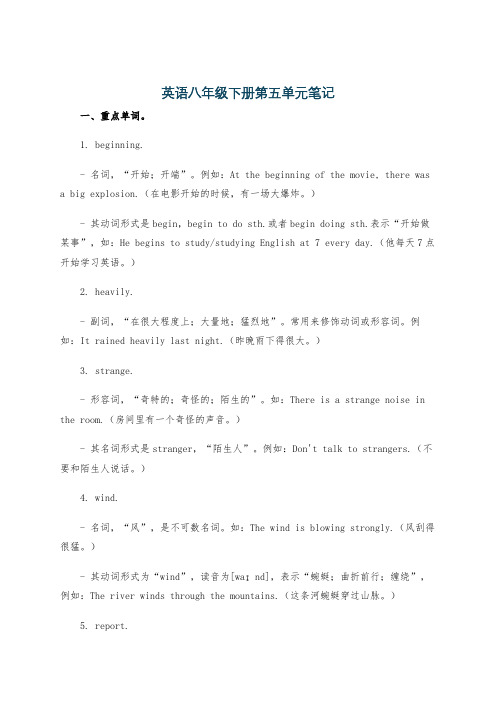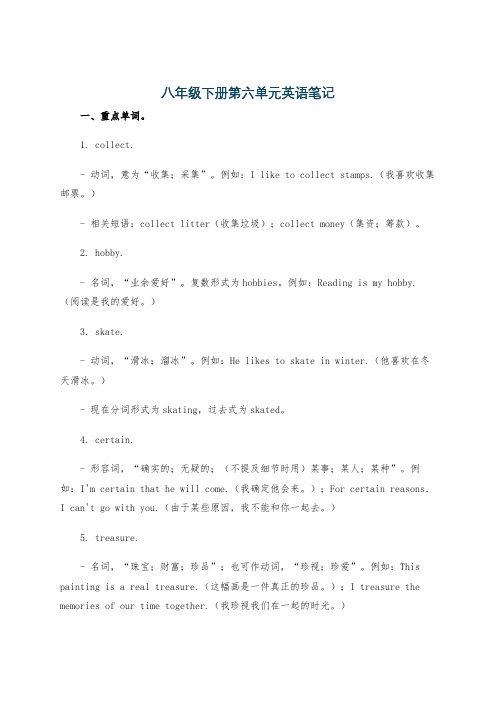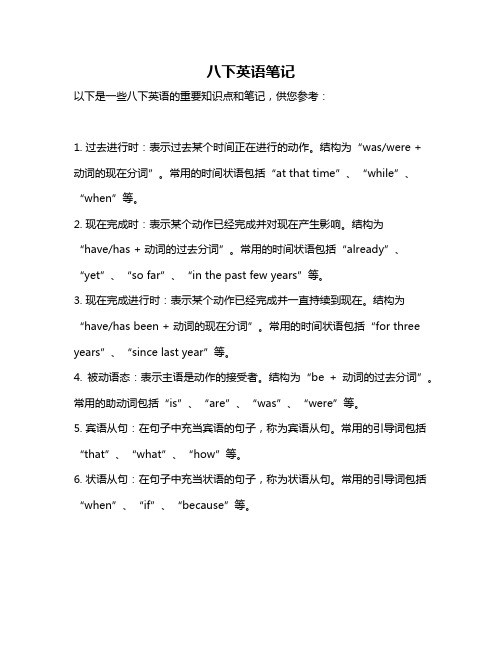八年级下英语笔记
英语八年级下册第五单元笔记

英语八年级下册第五单元笔记一、重点单词。
1. beginning.- 名词,“开始;开端”。
例如:At the beginning of the movie, there was a big explosion.(在电影开始的时候,有一场大爆炸。
)- 其动词形式是begin,begin to do sth.或者begin doing sth.表示“开始做某事”,如:He begins to study/studying English at 7 every day.(他每天7点开始学习英语。
)2. heavily.- 副词,“在很大程度上;大量地;猛烈地”。
常用来修饰动词或形容词。
例如:It rained heavily last night.(昨晚雨下得很大。
)3. strange.- 形容词,“奇特的;奇怪的;陌生的”。
如:There is a strange noise in the room.(房间里有一个奇怪的声音。
)- 其名词形式是stranger,“陌生人”。
例如:Don't talk to strangers.(不要和陌生人说话。
)4. wind.- 名词,“风”,是不可数名词。
如:The wind is blowing strongly.(风刮得很猛。
)- 其动词形式为“wind”,读音为[waɪnd],表示“蜿蜒;曲折前行;缠绕”,例如:The river winds through the mountains.(这条河蜿蜒穿过山脉。
)5. report.- 名词,“报告;报道”。
例如:I read a report about the accident in the newspaper.(我在报纸上读到了一篇关于这个事故的报道。
)- 动词,“报道;公布”。
如:The journalist reported the news on TV.(这位记者在电视上报道了这条新闻。
八年级下册第六单元英语笔记

八年级下册第六单元英语笔记一、重点单词。
1. collect.- 动词,意为“收集;采集”。
例如:I like to collect stamps.(我喜欢收集邮票。
)- 相关短语:collect litter(收集垃圾);collect money(集资;筹款)。
2. hobby.- 名词,“业余爱好”。
复数形式为hobbies。
例如:Reading is my hobby.(阅读是我的爱好。
)3. skate.- 动词,“滑冰;溜冰”。
例如:He likes to skate in winter.(他喜欢在冬天滑冰。
)- 现在分词形式为skating,过去式为skated。
4. certain.- 形容词,“确实的;无疑的;(不提及细节时用)某事;某人;某种”。
例如:I'm certain that he will come.(我确定他会来。
);For certain reasons, I can't go with you.(由于某些原因,我不能和你一起去。
)5. treasure.- 名词,“珠宝;财富;珍品”;也可作动词,“珍视;珍爱”。
例如:This painting is a real treasure.(这幅画是一件真正的珍品。
);I treasure the memories of our time together.(我珍视我们在一起的时光。
)6. island.- 名词,“岛”。
例如:There is a beautiful island in the sea.(海里有一个美丽的岛。
)7. page.- 名词,“(书刊或纸张的)页;面;张”。
例如:Turn to page 10.(翻到第10页。
)8. hurry.- 动词,“匆忙;赶快”;名词,“匆忙;急忙”。
- 常用短语:hurry up(赶快;急忙(做某事));in a hurry(匆忙地;急于)。
例如:Hurry up, or we'll be late.(快点,否则我们要迟到了。
八年级下册英语6单元笔记

八年级下册英语6单元笔记一、重点单词。
1. shoot (shot, shot)- v. 射击;发射。
例如:In the story, Hou Yi shot down nine suns.(在这个故事中,后羿射下了九个太阳。
)2. stone.- n. 石头。
例如:There are many stones on the road.(路上有很多石头。
)3. weak.- adj. 虚弱的;无力的。
例如:The old man is too weak to walk far.(这位老人太虚弱了,走不了多远。
)- 反义词:strong(强壮的)4. god.- n. 神;上帝。
例如:In Greek mythology, there are many gods.(在希腊神话中,有很多神。
)5. remind.- v. 提醒;使想起。
- 用法:remind sb. of sth. 例如:The photo reminds me of my childhood.(这张照片使我想起了我的童年。
)- remind sb. to do sth. 例如:Please remind me to lock the door.(请提醒我锁门。
)6. bit.- n. 一点;小块。
a bit=a little,可修饰形容词或副词。
例如:This box is a bit heavy.(这个盒子有点重。
)- a bit of = a little,修饰不可数名词。
例如:There is a bit of water in the glass.(杯子里有一点水。
)7. silly.- adj. 愚蠢的;不明事理的。
例如:It's silly of you to do that.(你做那件事很愚蠢。
)8. instead of.- 代替;反而。
例如:I will go instead of you.(我将代替你去。
八年级下册英语课堂笔记

八年级下册英语课堂笔记一、Unit 1 What's the matter?1. 重点单词。
- matter n.事情;问题。
常用短语:What's the matter? = What's wrong? = What's the trouble? 用来询问某人出了什么事。
- have a cold感冒。
例如:I have a cold. I feel terrible.- stomachache n.胃痛;腹痛。
stomach(胃)+ache(疼痛)构成的合成词,类似的还有headache(头痛),toothache(牙痛)等。
- foot n.脚,复数形式是feet。
例如:My feet hurt.- lie v.躺;平躺,过去式是lay,过去分词是lain。
短语lie down躺下。
如:You should lie down and rest.2. 重点短语。
- take one's temperature量体温。
例如:The doctor took my temperature.- have a fever发烧。
例如:He has a fever. He should see a doctor.- take breaks (take a break)休息。
例如:You should take breaks when you are tired.- get off下车。
如:Get off the bus at the next stop.- to one's surprise使……惊讶的是;出乎……意料。
例如:To my surprise, he can speak French very well.3. 重点句型。
- What should she do?她应该做什么?- She should see a dentist and get an X - ray.她应该看牙医并且拍X光片。
八年级英语下册第三单元笔记

八年级英语下册第三单元笔记一、重点单词。
1. rubbish.- n. 垃圾;废弃物。
例如:There is a lot of rubbish on the street.(街道上有很多垃圾。
)2. fold.- v. 折叠;对折。
如:Fold the paper in half.(把纸对折。
)3. sweep.- v. (swept, swept) 扫;打扫。
例如:I sweep the floor every day.(我每天扫地。
)4. floor.- n. 地板;地面。
如:The book is on the floor.(书在地板上。
)5. mess.- n. 杂乱;不整洁。
例如:What a mess!(多么杂乱啊!)6. throw.- v. (threw, thrown) 扔;掷。
例如:Don't throw rubbish everywhere.(不要到处扔垃圾。
)7. neither.- adv. 也不。
用于否定句中,表示前面所说的情况也适用于后者。
例如:He doesn't like apples, neither do I.(他不喜欢苹果,我也不喜欢。
)- pron. 两者都不。
例如:Neither of them is right.(他们两个都不对。
)8. shirt.- n. 衬衫。
如:This is a white shirt.(这是一件白色的衬衫。
)9. pass.- v. 给;递;走过;通过。
例如:Pass me the salt, please.(请递给我盐。
);He passed the exam.(他通过了考试。
)10. borrow.- v. 借;借用。
例如:Can I borrow your pen?(我能借用你的钢笔吗?)11. lend.- v. (lent, lent) 借给;借出。
例如:I can lend you some money.(我可以借给你一些钱。
八下英语笔记

八下英语笔记以下是一些八下英语的重要知识点和笔记,供您参考:1. 过去进行时:表示过去某个时间正在进行的动作。
结构为“was/were + 动词的现在分词”。
常用的时间状语包括“at that time”、“while”、“when”等。
2. 现在完成时:表示某个动作已经完成并对现在产生影响。
结构为“have/has + 动词的过去分词”。
常用的时间状语包括“already”、“yet”、“so far”、“in the past few years”等。
3. 现在完成进行时:表示某个动作已经完成并一直持续到现在。
结构为“have/has been + 动词的现在分词”。
常用的时间状语包括“for three years”、“since last year”等。
4. 被动语态:表示主语是动作的接受者。
结构为“be + 动词的过去分词”。
常用的助动词包括“is”、“are”、“was”、“were”等。
5. 宾语从句:在句子中充当宾语的句子,称为宾语从句。
常用的引导词包括“that”、“what”、“how”等。
6. 状语从句:在句子中充当状语的句子,称为状语从句。
常用的引导词包括“when”、“if”、“because”等。
7. 虚拟语气:表示与实际情况相反的情况或不可能实现的愿望。
结构为“would/could/might + 动词的过去分词”。
常用的时间状语包括“if only”、“in my dreams”等。
8. 情态动词:表示推测或意愿的动词,常用的情态动词包括“can”、“may”、“must”、“should”等。
9. 不定代词:表示不确定的人、事物或数量的代词,常用的不定代词包括“some”、“any”、“no”、“every”、“all”等。
10. 介词:表示名词、代词与动词之间的关系,常用的介词包括“at”、“in”、“on”、“with”、“by”等。
人教版八下英语u8笔记
人教版八下英语u8笔记
以下是有关人教版八下英语u8的笔记,供您参考:
Unit 8 grammar
一、被动语态的构成:
被动语态由助动词be和及物动词的过去分词构成,其基本结构为“be+及物动词的过去分词”。
使用被动语态时需要根据时态和人称进行变化。
二、被动语态的时态:
被动语态有多种时态,包括一般现在时、一般过去时、一般将来时、现在进行时、过去进行时、现在完成时、过去完成时等。
具体形式如下:
1. 一般现在时:am/is/are+过去分词
2. 一般过去时:was/were+过去分词
3. 一般将来时:will be+过去分词
4. 现在进行时:am/is/are being+过去分词
5. 过去进行时:was/were being+过去分词
6. 现在完成时:have/has been+过去分词
7. 过去完成时:had been+过去分词
三、被动语态的用法:
被动语态常用于以下情况:
1. 不知道或不想指出动作的执行者。
2. 强调动作的承受者。
3. 在科技文献和新闻报道中,为了强调客观事实。
4. 在一些习惯用法中,如“It is said that…”(据说……)和“He will be invited to the party.”(他将受邀参加聚会。
)等。
四、主动语态与被动语态的转换:
将主动语态转换为被动语态的方法是将宾语变成主语,将谓语变成被动结构(be+过去分词),将原主语放在by后面,作为被动句中的宾语。
如果原主语不出现,被动句中常常以it作为形式主语。
八下英语译林版笔记
八下英语译林版笔记English Answer:Unit 1:Lesson 1:Vocabulary: Hobbies, interests, personality traits. Grammar: Present simple tense, verb "to be"Lesson 2:Vocabulary: Daily routines, time expressions.Grammar: Present continuous tense, time adverbs.Lesson 3:Vocabulary: School life, subjects, classrooms.Grammar: Possessive pronouns, prepositions of place.Unit 2:Lesson 4:Vocabulary: Animals, animal habitats.Grammar: Present perfect tense, past participles.Lesson 5:Vocabulary: Food, drinks, meals.Grammar: Comparatives and superlatives.Lesson 6:Vocabulary: Clothing, accessories, stores.Grammar: Modal verbs (can, could, may, might)。
Unit 3:Lesson 7:Vocabulary: Weather, seasons, climate.Grammar: Conditional sentences (Type 1)。
Lesson 8:Vocabulary: Travel, transportation.Grammar: Past simple tense, irregular verbs.Lesson 9:Vocabulary: Sports, activities, fitness.Grammar: Future simple tense, time expressions.Unit 4:Lesson 10:Vocabulary: Science, experiments, discoveries. Grammar: Passive voice.Lesson 11:Vocabulary: Technology, gadgets, social media. Grammar: Present perfect continuous tense.Lesson 12:Vocabulary: Art, music, literature.Grammar: Relative clauses.Unit 5:Lesson 13:Vocabulary: Health, nutrition, lifestyle.Grammar: Modal verbs (should, must, have to)。
英语八年级下册第一单元笔记
英语八年级下册第一单元笔记一、重点单词。
1. matter.- n. 问题;事情。
例如:What's the matter?(怎么了?)- v. 重要;要紧。
例如:It doesn't matter.(没关系。
)2. stomachache.- n. 胃痛;腹痛。
这是一个合成词,由“stomach(胃)+ache(疼痛)”构成。
3. foot.- n. 脚;足。
复数形式是“feet”。
例如:I hurt my feet.(我伤到我的脚了。
)4. neck.- n. 颈;脖子。
5. fever.- n. 发烧。
例如:He has a high fever.(他发高烧了。
)6. lie.- v. (lay - lain)躺;平躺。
例如:You should lie down and rest.(你应该躺下休息。
)- v. 说谎。
过去式是“lied”,过去分词是“lied”。
例如:He lied to me.(他对我撒谎了。
)7. rest.- v. & n. 放松;休息。
例如:Let's have a rest.(让我们休息一下吧。
)8. cough.- v. & n. 咳嗽。
例如:He coughs a lot.(他咳嗽得很厉害。
)9. X - ray.- n. X射线;X光。
10. toothache.- n. 牙痛。
也是合成词,“tooth(牙齿)+ache(疼痛)”。
二、重点短语。
1. have a cold.- 感冒。
例如:I have a cold. I feel terrible.(我感冒了。
我感觉很糟糕。
)2. have a stomachache.- 胃痛;肚子疼。
3. lie down.- 躺下。
4. take one's temperature.- 量体温。
例如:You should take your temperature first.(你应该先量一下体温。
八年级下册英语第七单元知识点笔记
八年级下册英语第七单元知识点笔记一、主要短语achieve one's dream 实现某人的梦one’s dream will come true 某人的梦想将会实现any other mountain 其它任何一座山any other student 任何一个其他的学生as big as 与……一样大as far as I know 据我所知at birth 在出生的时候be in danger 处于危险之中be out of danger 在危险之外cut down the forests 砍伐林木endangered animals 濒危动物even though/if 虽然;尽管every two years 每两年fall over 摔倒feel free to do sth. 随意地做某事fewer and fewer pandas 大熊猫越来越少freezing weather 冰冻的天气give up doing sth. 放弃做某事in the face of difficulties 面临危险in the world 在世界上in the future 在未man-made objects 人造物体of all the salt lakes 在所有的咸水湖中one of the oldest countries 最古老的国家之一part of... ...... 的组成部分prepare sth. for sb. 为某人准备某物reach the top 到达顶峰run along 跨越……run over with excitement 兴奋地跑过去take care of 照顾;照料take in air 呼吸空气the first to do sth. 第一个做某事的人the forces of nature 自然界的力量the highest mountain 最高的山脉the importance of saving these animals 拯救这些动物的重要性walk into sb. 撞到某人be amazed/surprised at 对……感到惊讶protect sb./ sth. from doing 保护某人或某物不做某事keep sb./ sth. (from) doing保持某人或某物不做某事stop sb./ sth. from doing阻止某人或某物不做某事8844.43 meters high/ in height 8844.43米高1.8 meters tall 1.8米高2 meters away 2米远2 meters wide/ in width 2米宽2 meters long/ in length 2米长2 meters deep/ in depth 2 米深2 kilos in weight 2公斤重a book on Chinese history 一本关于中国历史的书as you can see 正像你所看到的那样as you know 正像你所知道的那样as you hear 正像你所听到的那样2 kilos of meat 2公斤肉the answer to… ……的答案the key to… ……的答案/钥匙do search调查black and white 黑白die of a heart problem 死于心脏病die from an accident 死于一次事故live to be 活到be serious about 对…… 认真on land 在陆地上in the sea 在大海on the earth 在地球上in the world 在世界上set up a club 建立一个俱乐部be under much pressure = be stressed out 压力大二、主要词的用法和句子讲解1.6,671 kilometers long 长6 671千米(1)用“数词+名词(复数)+形容词”的结构表示长、宽、高、深及年龄等。
- 1、下载文档前请自行甄别文档内容的完整性,平台不提供额外的编辑、内容补充、找答案等附加服务。
- 2、"仅部分预览"的文档,不可在线预览部分如存在完整性等问题,可反馈申请退款(可完整预览的文档不适用该条件!)。
- 3、如文档侵犯您的权益,请联系客服反馈,我们会尽快为您处理(人工客服工作时间:9:00-18:30)。
? horse riding ? hiking
? sightseeing
? 去骑马
? 去远足
? 去观光
大家好
16
6. dress 【例句】
Get up and dress quickly. 赶快起床穿衣服。
The mother is dressing her baby. 母亲正在给婴儿穿衣服。
【点拨】 dress 可作不及物动词,
I was alone, but I did not feel lonely. 我虽独自一人, 但我不感到寂寞。
大家好
14
5. I'll probably go skating and swimming every day. 我可能会天天去滑冰和游泳。
“go + v-ing”是一种固定结构,意思是 “去……”,其中的动词多是表示户外 活动的。
? I don't think he will come.
? 我想他不会来的。
大家好
2
? 2. Everything will be free?
? 一切都是免费的?
句中形容词free 意思是“免费的”。
? They enjoy free medical care. ? 他们享受免费医疗。 ? Admission is free for children under 9. ? 九岁以下儿童免费。
大家好
15
? 和go连用构成固定短语的动词 -ing形式
? swimming ? shopping ? skating ? skiing
? 去游泳
? 去购物 ? 去滑冰 ? 去滑雪
? roller skating
? 去滑旱冰
? fishing ? 去钓鱼
? hunting ? bike riding ? 去打猎 ? 去骑自行车
He has fallen in love with Mary.
他已爱上了玛丽。
大家好
10
3. As a reporter, I think I will meet lots of interesting people. 作为一名记者,我想我会认识很多有趣 的人。 句中as是介词, 作“作为”解, 后多接表 示职业的名词。
大家好
1
Language points on listening
? 1. … I don't think people will use money.
? ……我认为人们就将不再用钱了。
people will use money 是省略了连词that 的宾语从句。当主句是I think 结构时, 否 定的宾语从句中的not 要前移到主句。
He'll come back in a week.
他将于一周之后回来。
大家好
9
2. … because I went to Shanghai last r and fell in love with it.
…… 因为我去年到上海,一下子就喜 欢上了它。 fall in love with… 意思是“爱上……”, 其中with 是介词,后接名词或代词。
She works as an interpreter in that
company.
她在该公司里担任翻译员。
大家好
11
4. … I don't like living alone.
…… 我不喜欢一个人住。
句中alone 是副词,作“单独地”解,多修 饰一个动词作状语。
For years Mary lived alone in New York. 玛丽孤身一人在纽约生活了好几年。
大家好
3
? 3. I think there will be only one country.
? 我认为将来只有一个国家。
there will be … 是There be 句型的拓展, 表达“将有”或“将会有”,其中will 表示猜测, 作“可能; 大概”解。
? This will be the house you're looking for.
?其中will是情态动词。
?那么该句型的否定式和疑问式是什么 样子呢?
大家好
7
There will be more pollution in the future.
否定式:There will not (won't) be more pollution in the future.
疑问式:Will there be more pollution in the future?
大家好
12
此外,alone 还可用作形容词,意思是 “单独的;独自的”,但一般只作表语, 而不能作定语。
She watches TV when she is alone . 独自一人时,她便看电视。
大家好
13
【拓展】 lonely作形容词,可意为 “寂寞的”,有较浓厚的感情色彩, 在句中作表语或定语。例如:
意为“穿好衣裳”;dress 还可作及物
动词,意为“给……穿好衣裳”。
大家好
17
【拓展】 dress up意为“穿上盛装、打 扮”。例如:
句中less是副词little 的比较级。little 可用作 副词, 意思是“少”, 可修饰动词作状语。 You rest too little . 你休息得太少了。
大家好
6
2c
Language focus
There will be… 句型
?There will be… 是There be 句型的拓 展,作“将有;将会有”解。
肯定回答: Yes, there will.
肯定回答:No, there won't.
大家好
8
Language points
1. In ten years, I think I'll be a reporter.
十年后,我想我会当一名记者。
句中介词in意思是“在……以后”,后接 表示一段时间的词语,多和将来时态连用。
? 这大概就是你找的那所房子了。
大家好
4
? 4. I hope so.
? 我希望如此。
句中so是副词,意思是“就像那样; 是这样”,承接前句,以避免重复 前面所说过的内容。
? If you want to go home, just say so.
? 如果你想回家的话,尽管说好了。
大家好
5
People will use the subways less. 人们将较少使用地铁。
